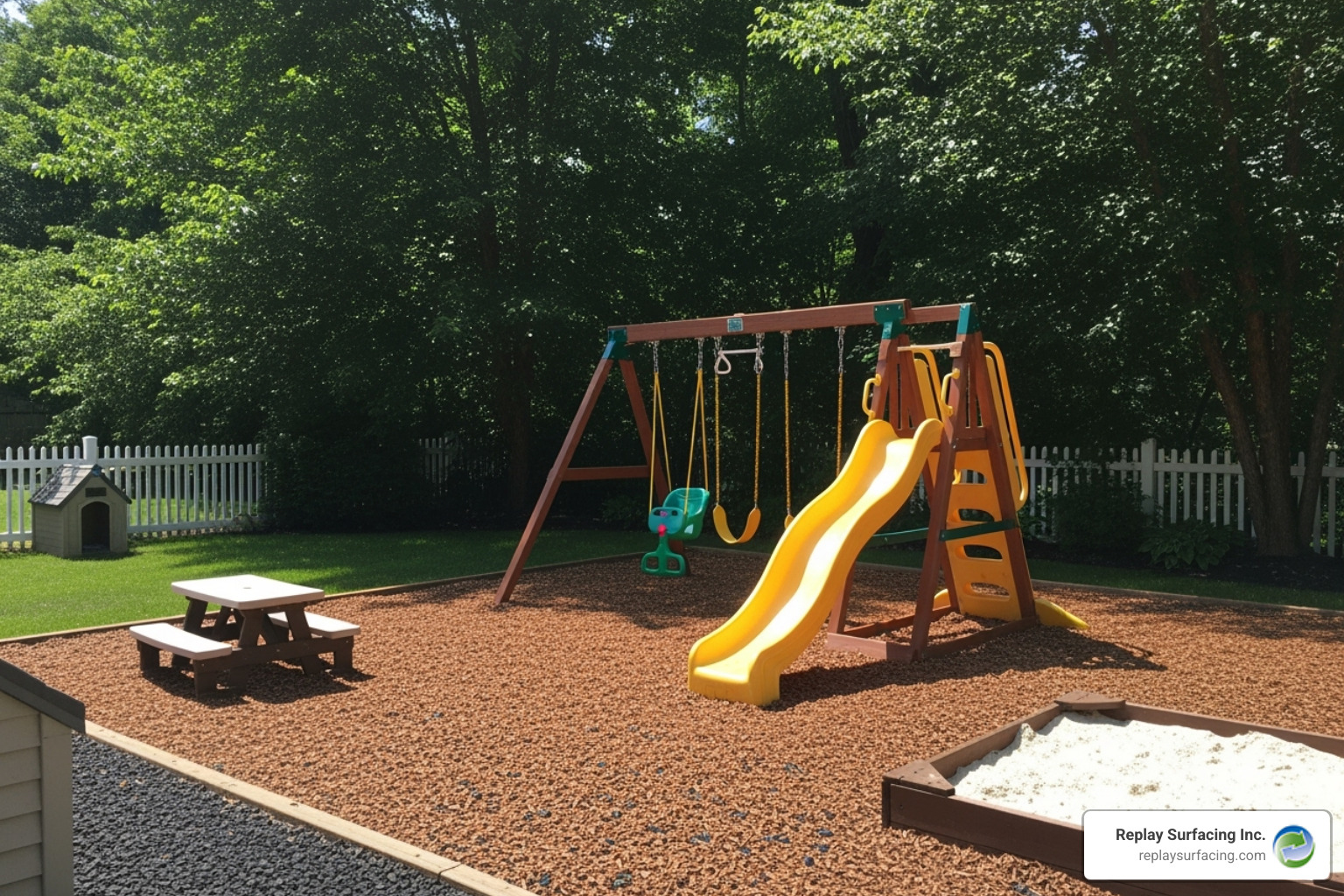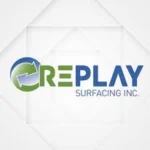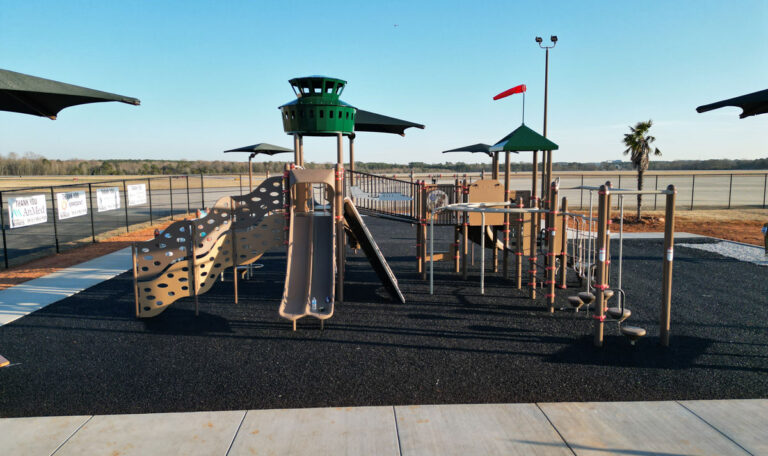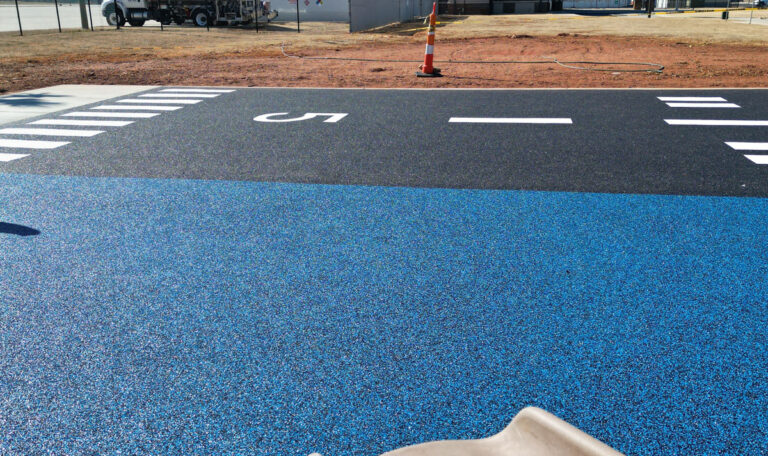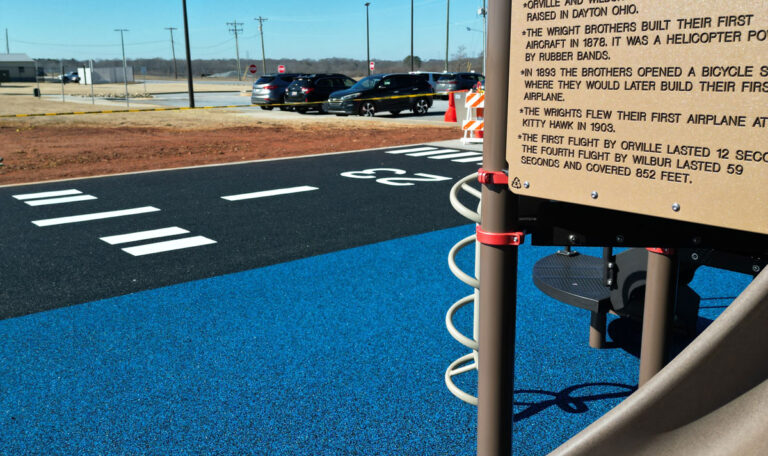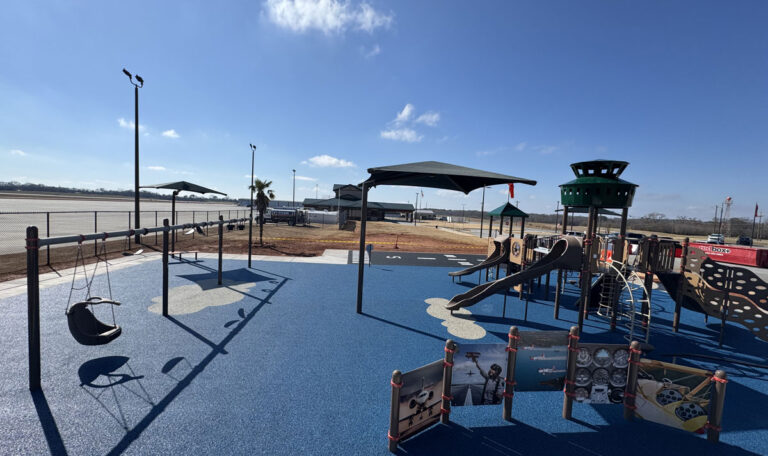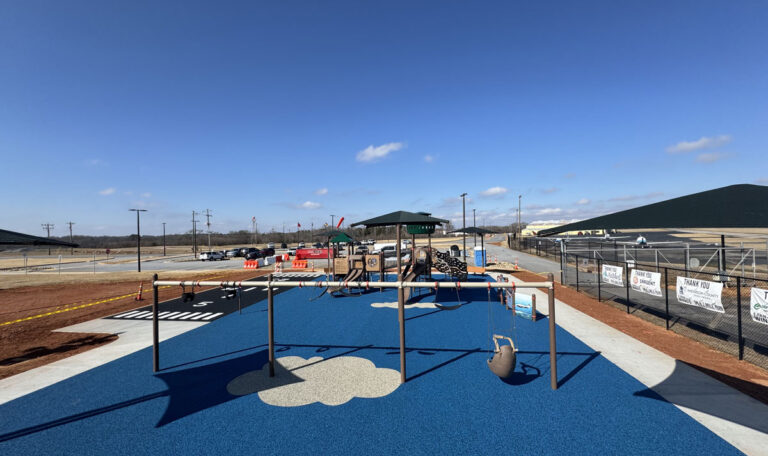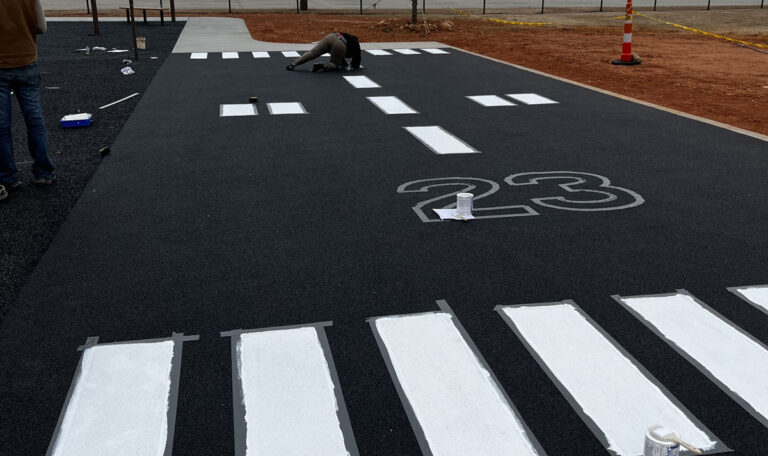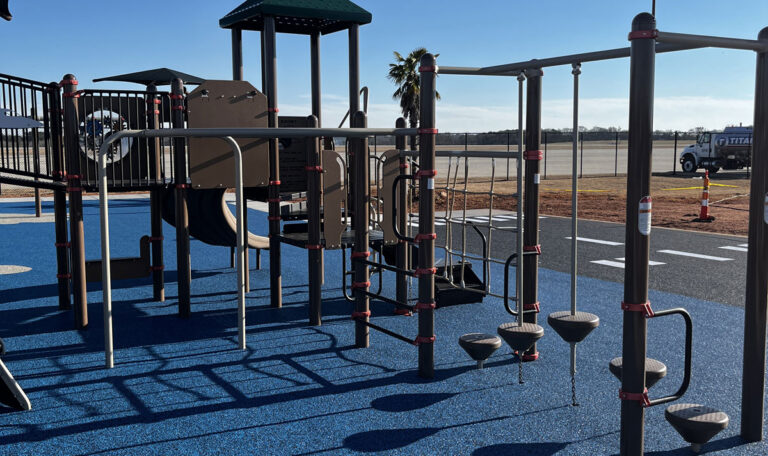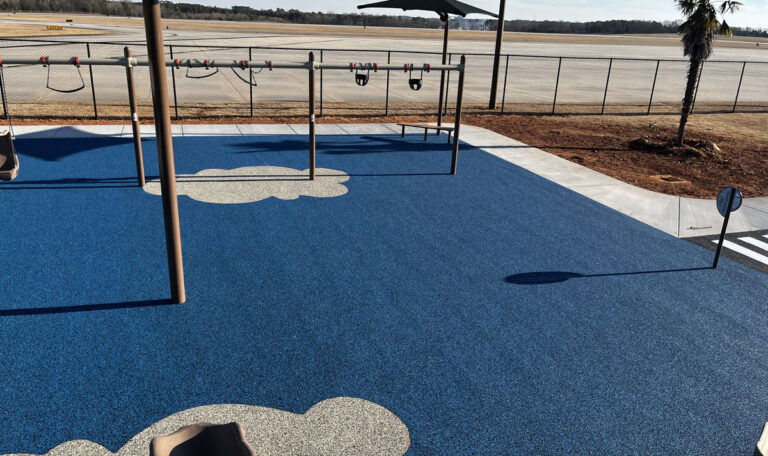Why Rubber Mulch in Charlotte NC is Gaining Ground
Rubber mulch installations are revolutionizing how homeowners and facility managers in Charlotte, NC, approach landscaping. Here’s what you need to know about this innovative ground cover option:
Key Benefits:
- Durability: Lasts 10+ years vs. 1-2 years for wood mulch
- Safety: Superior fall protection for play areas
- Low Maintenance: No annual replacement needed
- Eco-Friendly: Made from 100% recycled tires
- Pest Resistant: Won’t attract termites or carpenter ants
Potential Drawbacks:
- Higher upfront cost than organic mulch
- Doesn’t add nutrients to soil
- Can get hot in direct sunlight
- Removal can be challenging
Rubber mulch transforms discarded tires into a practical landscaping solution. The process involves shredding recycled tires after removing steel components, creating nuggets that range from 10mm to 32mm in size. This material offers excellent weed suppression and moisture retention while providing a cushioned surface ideal for playgrounds and garden beds.
The big question: Is trading the natural decomposition cycle of organic mulch worth the long-term durability and safety benefits of rubber alternatives?
As Landon Olson from Replay Surfacing, I’ve spent years changing millions of pounds of scrap tires into sustainable surfacing solutions, including rubber mulch applications across our service areas. My mechanical engineering background and MBA help me apply both technical expertise and business sense to create eco-friendly products that solve real-world landscaping challenges.
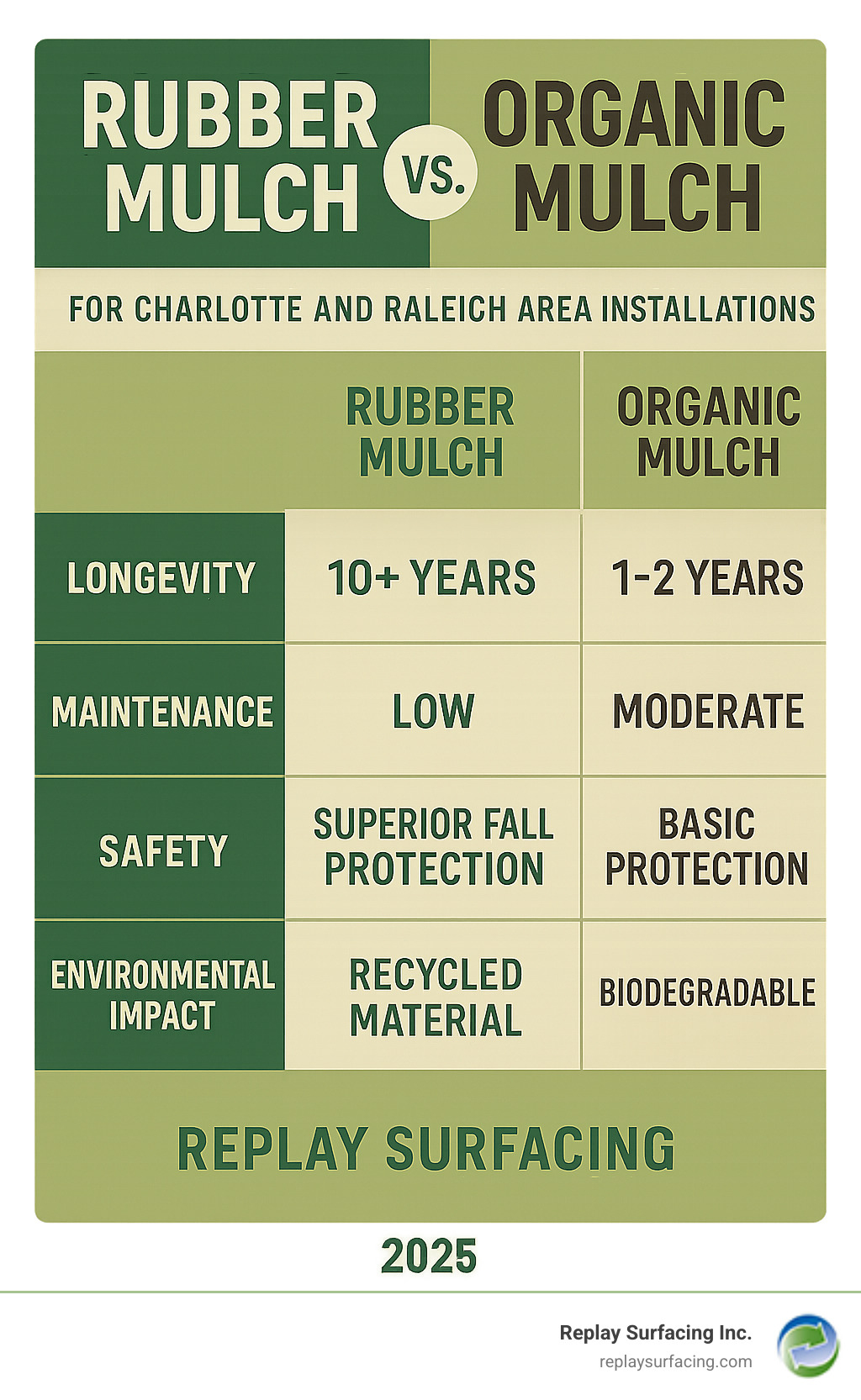
Rubber mulch terms to remember:
What is Rubber Mulch and How Is It Made?
Rubber mulch is an innovative ground cover solution born from recycled tires, giving millions of old tires a second chance at life in landscapes across Charlotte and beyond. It’s a practical and environmentally responsible choice.
At Replay Surfacing Inc., we turn discarded vehicle tires—part of the 290 million scrap tires discarded annually in the US—into landscaping treasures, giving them purpose instead of letting them become environmental hazards.
Our tire recycling process is thorough. We clean each tire before the crucial steel band removal phase. Using powerful magnetic equipment, we extract all metal, ensuring our final product is virtually wire-free—a critical safety feature for any rubber mulch application.
Next, shredding and grinding turn these tires into uniform pieces, from fine crumb rubber to larger nuggets. Each form serves different purposes while sharing the same DNA of durability and sustainability.
The Different Types of Rubber Mulch
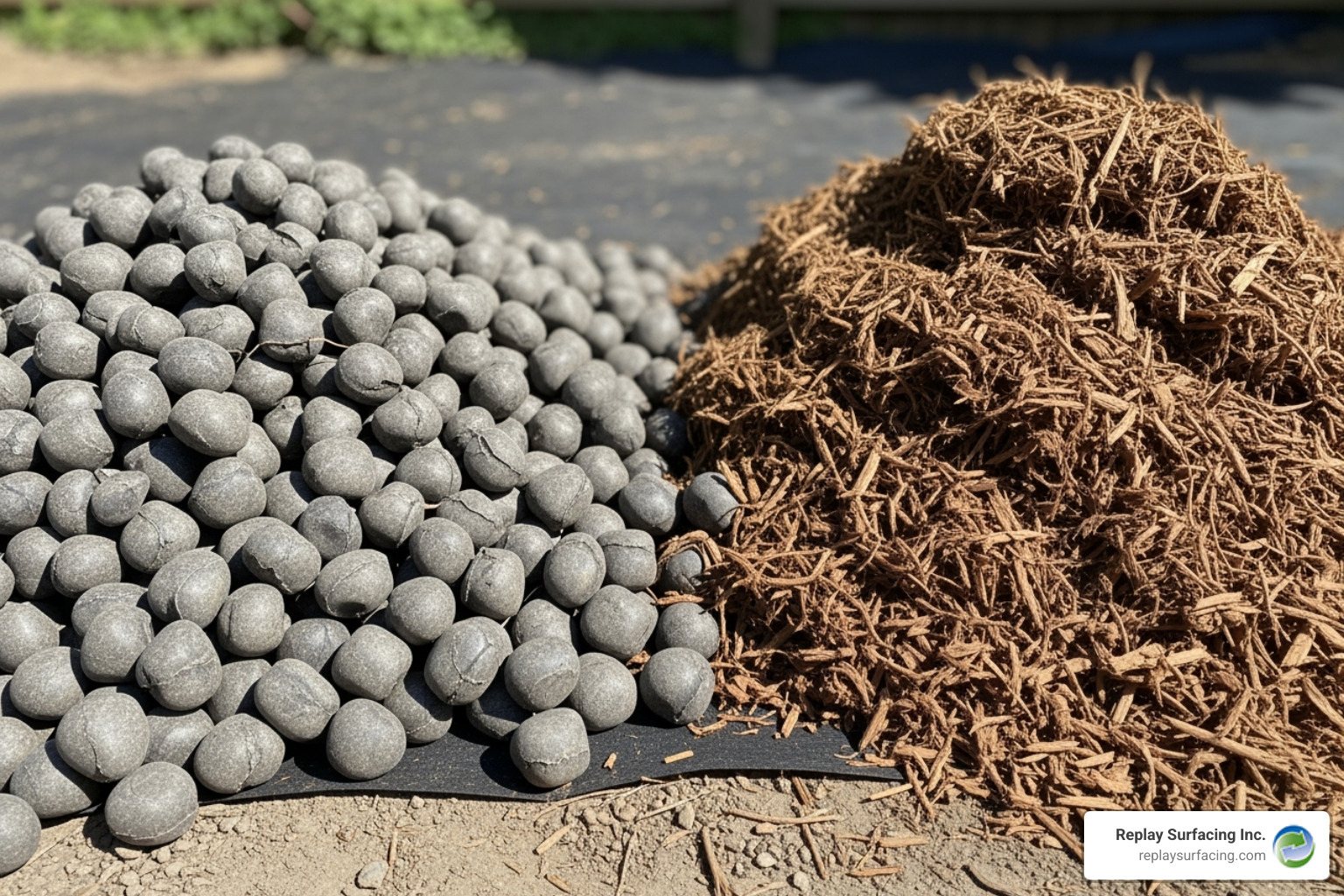
When planning your rubber mulch project in Charlotte, NC, understanding the different forms available helps you make the best choice.
Nuggets vs. shredded is often the first decision. Rubber nuggets offer a clean, uniform look popular for playgrounds, providing consistent cushioning. Shredded rubber mulch mimics the look of wood mulch with superior longevity.
Our Recycled Rubber Mulch comes in both forms. For most landscaping, loose fill options work perfectly—spread them like traditional mulch and enjoy years more performance.
Loose Rubber Mulch is ideal for garden beds and around trees, as it interlocks once settled. This makes it resistant to wind and washaway, a real advantage during North Carolina’s stormy seasons.
For permanent installations, Resin Bound Rubber Mulch creates seamless, durable surfaces for pathways and high-traffic areas. This bonded approach combines rubber with binders for a beautiful, low-maintenance surface.
We also offer pre-formed rubber mulch rings for trees and shrubs, plus rubber mulch mats and sheets for quick installation on smaller projects in our service areas.
Color options set rubber mulch apart. Using non-toxic pigments in durable coatings, we create vibrant, lasting colors. From earthy browns to playful reds and blues, your yard with rubber mulch will maintain its aesthetic appeal for years without fading.
The beauty lies in knowing every square foot of rubber mulch represents tires diverted from landfills and given new purpose in landscapes across Charlotte and beyond.
The Great Debate: Pros and Cons of Rubber Mulch in Charlotte NC
Choosing the right ground cover for your Charlotte, NC, garden or play area is a big decision. Using rubber mulch in your yard offers amazing benefits but also has trade-offs. Let’s explore what makes this recycled material so appealing and where it might not be the perfect fit.
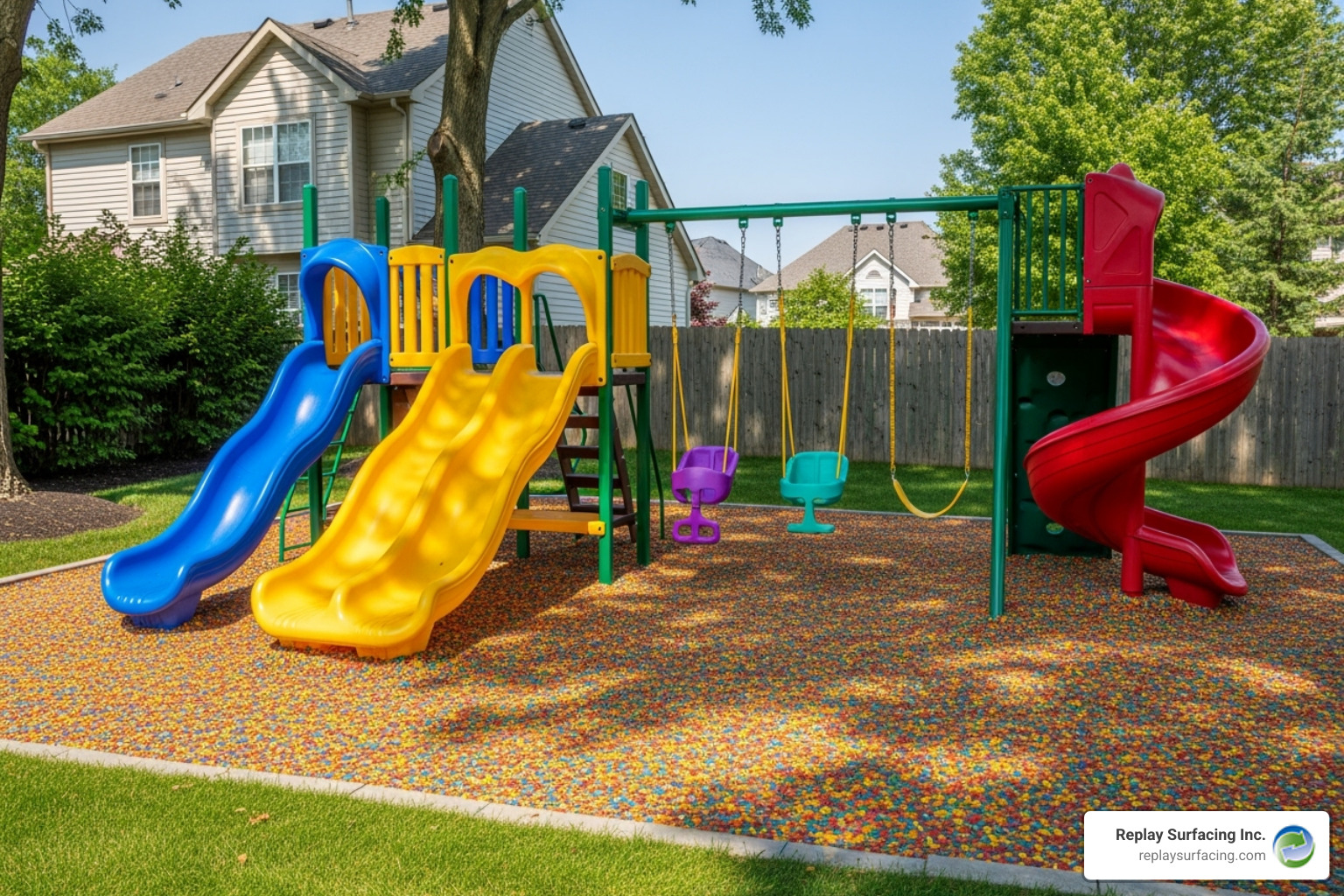
Key Benefits for Landscaping and Play Areas
Rubber mulch’s incredible longevity is a major draw. While wood mulch needs replacing every 1-2 years, rubber mulch lasts 10 to 20 years. This “set it and forget it” approach saves busy homeowners across our service areas significant time and money.
Rubber mulch excels in safety applications. Its natural elasticity creates a cushioned surface ideal for breaking falls, making it invaluable for playgrounds that meet ASTM F1292-09 safety standards. This superior fall protection gives parents peace of mind. Learn more in our guide on Advantages of Playground Rubber Mulch: Safety, Maintenance, and Durability.
Rubber mulch handles water beautifully. Being non-porous, it doesn’t absorb water like wood mulch. Rainwater drains through to plant roots, and the mulch layer helps retain soil moisture. This drainage is valuable in areas with heavy rain.
Weed suppression is another benefit. Rubber mulch blocks sunlight and dehydrates weed seeds before they sprout, meaning less time weeding and more time enjoying your yard.
Rubber mulch doesn’t attract pests like termites, carpenter ants, or rodents because it isn’t a food source, unlike organic mulches.
Rubber mulch also stays put better than lighter organic options during storms. Plus, many of our products include a 12-year color warranty, ensuring a vibrant landscape for over a decade without the fading common to other materials.
Potential Drawbacks and Criticisms
Now for the drawbacks. Rubber mulch doesn’t feed your soil like decomposing organic matter. It acts as a ground cover without contributing to the soil ecosystem. Some experts, like researchers at WSU in “The Myth of Rubberized Landscapes,” question this trade-off for garden beds.
Heat absorption is a concern in our warmer service areas like Charlotte. Dark rubber gets hot in direct sun, which can raise soil temperatures. While this may benefit some plants, it can make surfaces uncomfortable for bare feet, pets, or children in summer.
The flammability issue is serious. While harder to ignite, rubber mulch burns hotter and faster than organic mulches once it catches fire, producing toxic smoke. It is unsuitable near fire pits, grills, or in fire-prone areas and must be kept away from ignition sources.
Rubber mulch isn’t completely maintenance-free. Weeds can still sprout on top if seeds find moisture and debris. While it lasts for decades, it isn’t permanent and will eventually need attention.
Removal can be challenging. Its weight and tendency to interlock make it difficult to relocate or remove. Our Permanent Mulch: Recycled Rubber Outdoor Pathway for Gardens highlights this long-term commitment.
Finally, the upfront cost is higher than organic alternatives. However, its longevity and low maintenance mean the investment often pays off over time.
Safety, Health, and Environmental Concerns
When you’re considering rubber mulch for your Charlotte, NC, property, safety questions naturally come to mind. As someone who’s spent years changing millions of pounds of waste tires into useful products, I completely understand these concerns. Let’s address them honestly and thoroughly.
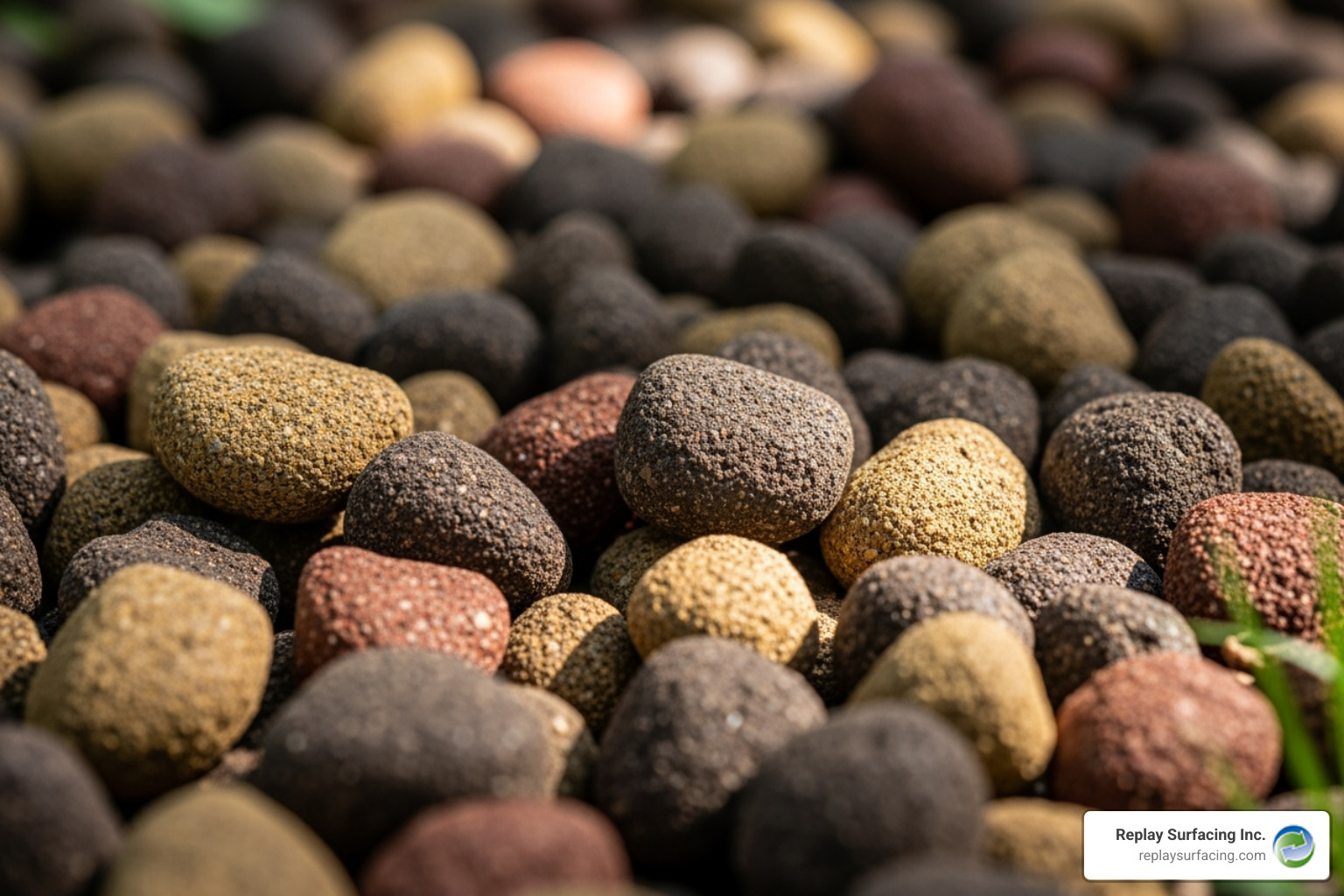
The irony isn’t lost on me that we’re taking what was once an environmental hazard – discarded tires piling up in landfills – and turning them into something beneficial for families and communities. But that doesn’t mean we should ignore legitimate safety questions.
Is Rubber Mulch Toxic? A Look at the Research
The toxicity question comes up in nearly every conversation I have with homeowners, especially parents planning playgrounds for their kids. It’s a fair concern, and the research gives us some reassuring answers.
The EPA has conducted extensive research through their Federal Research Action Plan on Recycled Tire Crumb. Their findings show that while tires do contain trace amounts of minerals and chemicals like zinc and other heavy metals, the concentrations that leach from rubber mulch into soil or water stay well below harmful levels.
One California study that particularly caught my attention found no skin sensitization in guinea pigs exposed to playground surfaces made from recycled tires. This suggests children playing on rubber surfaces shouldn’t experience skin reactions – good news for families in our Charlotte service area.
Our manufacturing process prioritizes safety at every step. We thoroughly clean all tires before processing and use powerful magnetic equipment to remove every bit of steel wire and metal contamination. This creates what we’re proud to call wire-free quality – a critical safety factor that gives parents peace of mind.
Volatile organic compounds (VOCs) can be emitted, especially when the mulch is new or during extreme heat. However, studies consistently show these concentrations remain well below harmful levels. We’ve worked hard to develop Non-Toxic Rubber Mulch options that families across Charlotte and our other communities can trust around their children and pets.
For parents still weighing concerns, our detailed page addressing Rubber Mulch Toxic questions provides additional research and peace of mind.
Flammability and Other Safety Considerations
Here’s where I need to be completely straightforward with you – flammability is a serious concern that requires careful planning.
Rubber mulch has a higher ignition temperature than wood mulch, meaning it’s harder to accidentally light. But once it catches fire, it burns hotter, spreads faster, and becomes incredibly difficult to extinguish. Landscape rubber mulch combustibility studies show it produces higher flame heights, faster fire spread rates, and maximum temperatures compared to organic alternatives.
This means strategic placement is essential. Never use rubber mulch near fire pits, barbecue grills, or any open flame sources. If you’re in a fire-prone area or love hosting backyard bonfires at your property, you’ll need to plan your rubber mulch layout carefully.
The safety benefits, however, are substantial in appropriate applications. ADA accessibility is excellent – the consistent texture and cushioning make playgrounds compliant with disability access standards. This matters enormously for schools, daycares, and municipal parks throughout our service areas.
Playground safety standards are where rubber mulch truly excels. Our products meet ASTM F1292-09 standards for impact attenuation, meaning they effectively cushion falls from playground equipment. The IPEMA certification process and CPSC recommendations outlined in their Public Playground Safety Handbook guide our manufacturing to ensure maximum child safety.
The bottom line? When properly installed away from fire hazards, rubber mulch provides superior fall protection that can prevent serious injuries – a trade-off many families and facility managers find worthwhile.
A Practical Guide to Installing Rubber Mulch in Your Charlotte Yard
When you’re ready to create your perfect yard with rubber mulch in Charlotte, a clear roadmap makes all the difference. Let’s cover everything from budgeting to installation and maintenance.
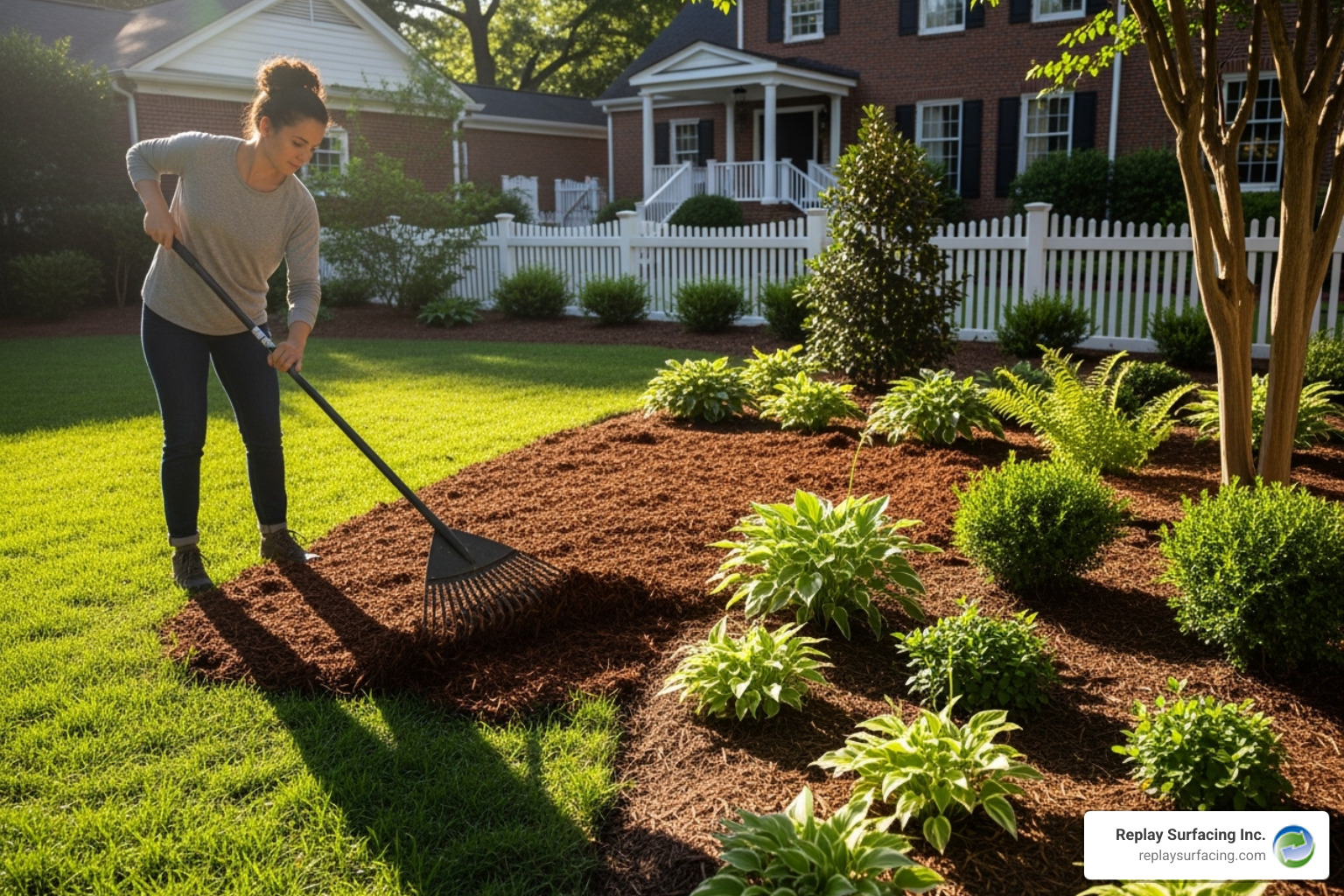
Cost, Durability, and Maintenance Compared to Organic Mulch
Comparing rubber mulch to wood mulch over time tells a compelling story. Rubber mulch has a higher initial cost—around $11 per cubic foot versus wood mulch’s $3—but this investment pays dividends.
Wood mulch in Charlotte needs replacing every 1-2 years, costing $15-30 per cubic foot over a decade, plus labor. In contrast, your rubber mulch performs for 10-20 years with minimal upkeep.
| Feature | Rubber Mulch | Wood Mulch (Organic) |
|---|---|---|
| Initial Cost | Higher (approx. $11 per cubic foot) | Lower (approx. $3 per cubic foot) |
| Lifespan | 10-20 years (or more) | 1-2 years (decomposes) |
| Annual Maintenance | Very Low (occasional raking, minimal top-ups) | High (annual replenishment, weeding, pest management) |
| Weed Control | Excellent (blocks sunlight, dehydrates seeds) | Good (blocks sunlight, but breaks down) |
| Pest Resistance | Excellent (does not attract insects like termites or carpenter ants) | Low (can attract pests) |
| Color Retention | Excellent (many products offer 12-year warranty) | Low (fades quickly, becomes grayish) |
The maintenance difference is significant. With rubber mulch, you avoid annual trips to the garden center and laborious spreading sessions, freeing up your weekends.
Installation Steps for Your Rubber Mulch Yard
Installing rubber mulch in your yard is straightforward, but following the right steps ensures lasting results. We’ve learned what works best from thousands of installations across our service areas.
Getting the foundation right is key. Start by clearing the area of all grass, weeds, and debris. Then, check your grading to ensure proper drainage, as water flows through rubber mulch rather than being absorbed.
Landscape fabric is recommended. Use commercial-grade geotextile fabric for superior weed suppression and to separate mulch from soil. Overlap seams by at least three inches and secure the perimeter to prevent future headaches.
Depth is crucial for function and safety. Use 1.5 to 2 inches for landscaping and garden beds. For playgrounds, install a 4- to 6-inch layer, depending on fall heights, to create the necessary safety cushioning.
Spreading and containment are the final steps. Distribute the mulch evenly and add retaining borders (plastic, wood, or stone) to keep it contained, especially on slopes or in playgrounds. Our Installing Rubber Mulch guide has more details.
Long-Term Performance of a Rubber Mulch Yard
The beauty of rubber mulch is its “install once, enjoy for decades” nature. Unlike organic mulch, it maintains its volume and performance for years.
The investment timeline is long. An installation performs for 10 to 20 years without major intervention. Our customers in Charlotte often forget the work their old wood mulch required.
Color stays vibrant due to high-quality polymer coatings, backed by our 12-year color warranty. Any fading after many years is minimal compared to wood mulch, which turns gray in one season.
Maintenance is minimal. Occasional raking can redistribute displaced mulch, and a quick hose rinse refreshes its look. You won’t need the annual top-ups or constant weeding that wood mulch requires.
Soil interaction is neutral. Rubber mulch doesn’t decompose or alter soil chemistry, providing insulation and moisture retention while maintaining soil pH. Apply any needed nutrients directly to the soil.
Frequently Asked Questions about Rubber Mulch
As someone who’s been in the business of changing waste tires into valuable surfacing solutions, I hear these questions almost daily from homeowners and facility managers across Charlotte and our other service areas. Let me share the answers that matter most when you’re considering rubber mulch.
How much rubber mulch do I need for my yard?
Calculating your coverage correctly saves money and headaches. The math is straightforward.
For most rubber mulch applications in your yard, calculate based on square footage and depth. A 50-pound bag covers about 30 square feet at 1 inch deep. For landscaping in Charlotte, you’ll want 2 inches of depth, so one bag covers about 15 square feet.
Playground installations in Charlotte need more cushioning. Plan for 4 to 6 inches of depth depending on equipment fall height. A 50-pound bag will cover 7 square feet at 4 inches or 5 square feet at 6 inches.
To simplify, measure your area’s square footage, decide on your depth, and let our team help with calculations. Our Rubber Mulch Per Ton page details bulk quantities for larger projects.
Will rubber mulch harm my plants?
This is a common concern, but the good news is that rubber mulch, when used properly, benefits most plants.
Its insulating properties are beneficial for gardens in our service areas. Soil stays 2 to 3 degrees warmer than under wood mulch, extending growing seasons in places like Nashville. In summer, it prevents moisture evaporation, reducing the need for watering, which is great for customers in hot climates like Arizona.
Moisture retention is a key benefit. It doesn’t absorb water, so moisture reaches plant roots and is protected from evaporation.
Regarding zinc leaching, research shows the trace amounts that leach out are well below harmful levels for most plants. The key is to never till rubber mulch into your soil; it’s a top barrier, not a soil amendment. Our The Pros and Cons of Recycled Rubber Walkways page has more on this.
Does rubber mulch smell?
Yes, new rubber mulch can have an initial odor. When you first install rubber mulch in your yard, you might notice a “new tire” scent, especially on a warm day. This is normal and not a cause for concern.
This initial odor comes from volatile organic compounds (VOCs) in the rubber. It’s most noticeable for the first few weeks, especially in high temperatures, as customers in hot climates like Lake Charles and Tucson have noted.
Reassuringly, the smell fades significantly within a few weeks to a couple of months as it airs out. Our manufacturing process is designed to minimize these initial odors.
On very hot days, you might notice a faint smell even after the initial period, but it’s far less pronounced. Most customers stop noticing it entirely after a month or two.
Is rubber mulch good for home landscaping?
Yes. It lasts longer than wood mulch, controls weeds, and reduces yearly maintenance.
Does rubber mulch get too hot in summer?
It can warm up in direct sunlight, so shade or lighter colors are recommended.
Conclusion: Is Rubber Mulch the Right Choice for You?
After weighing all the facts, benefits, and potential concerns, you might be wondering: is rubber mulch truly the right fit for your property? The honest answer isn’t black and white—it really comes down to your specific needs, priorities, and circumstances.
Throughout this guide, we’ve explored the impressive advantages that make rubber mulch appealing to so many homeowners and facility managers. The 10+ year lifespan means you can install it once and essentially forget about annual mulch replacement—a huge relief for busy families or commercial properties in Charlotte. The superior safety performance for playgrounds gives parents peace of mind, while the excellent weed suppression and pest resistance translate to less weekend yard work and fewer headaches.
Rubber mulch can be a smart choice for homeowners who want long-lasting ground cover with low maintenance and added safety. It works especially well for play areas, pathways, and high-traffic zones. At Replay Surfacing Inc., we help homeowners choose rubber mulch solutions that balance durability, safety, and environmental responsibility.
We’ve also been upfront about the challenges. The higher upfront investment can be a hurdle, though it typically pays for itself over time. The inability to enrich soil means you’ll need to think differently about plant nutrition. And the flammability concerns require careful planning around fire pits, grills, and other heat sources.
The sweet spot for rubber mulch applications includes playgrounds where safety is non-negotiable, low-maintenance landscaping projects where you want to “set it and forget it,” and areas plagued by pests like termites. It’s particularly valuable for high-traffic zones like pathways and commercial spaces across our service areas from Columbia, SC to Nashville, TN.
What excites us most at Replay Surfacing Inc. is the environmental impact. Every yard with rubber mulch we install represents hundreds of discarded tires diverted from landfills and transformed into something useful and beautiful. As someone who’s spent years in this industry, I find it incredibly rewarding to turn what was once considered waste into durable, safe surfaces that families enjoy for decades.
The decision ultimately rests on balancing your priorities. If you value longevity, safety, and minimal maintenance—and you can work around the potential drawbacks through smart planning—then rubber mulch could be exactly what your outdoor space needs.
Ready to explore how rubber mulch might transform your Charlotte property? Explore safe and sustainable playground surfacing options or reach out to our team. We’re here to help you make the best choice for your specific situation and ensure your investment serves you well for years to come.

